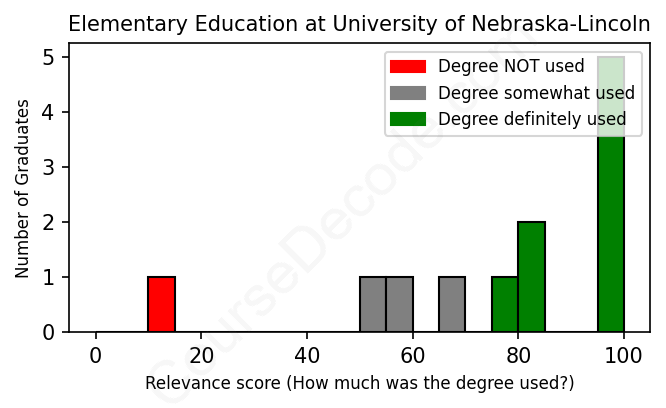
First, some facts. Of the Elementary Education graduates from University of Nebraska-Lincoln we've analyzed , here's how many have used (or NOT used) their degree in their career:

These are estimates based on AI analysis of 12 LinkedIn profiles (see below).
The verdict? Above average. Overall, with an average relevance score of 77%, Elementary Education graduates from University of Nebraska-Lincoln have a higher likelihood (+10%) of finding work in this field compared to the average graduate across all fields:
And for comparison, here's the chart for all profiles we've looked at across all degrees.
Also, after graduating, only 33% of these graduates have pursued further education other than another Bachelor's degree (such as a Masters degree or other), compared to the average across all profiles of 35%. This suggests a Bachelors degree is enough for most Elementary Education graduates, and it's normal to look for work straight after graduation.
See the details:
|
Relevance score: 81% We think this person has gone into a career highly relevant to their degree. We think this person has gone into a career highly relevant to their degree.
DEGREE INFOGraduated in 2018 from University of Nebraska-Lincoln with a Bachelor of Education - BEd in Elementary Education. Also pursued further education since (see below). JOB HISTORY SINCE GRADUATIONTeacher Lincoln Public Schools Aug 2018 - Present Group Exercise Instructor  Fallbrook YMCA Mar 2021 - Present FURTHER DEGREES DONE SINCE GRADUATINGMaster of Education - MEdDoane University 2021 - 2023 ABOUTNo information provided. |
The top 10 most common jobs done by the graduates we've analyzed (ranked most common to least) are:
When looking at the job profiles of graduates from the University of Nebraska-Lincoln with a degree in Elementary Education, it’s clear that a significant number of them have taken roles that are closely related to education. Most common jobs include various teaching positions, like those at Lincoln Public Schools or Omaha Public Schools, where they are directly applying what they learned about child development, classroom management, and pedagogical strategies. Many graduates have experience as classroom teachers, which shows that a solid portion of them have remained in the education field, using their degrees effectively in settings that focus on teaching young students.
However, not all the roles they have taken on are directly related to teaching. Some graduates shifted into positions like account management, event administration, or even sales roles that do not leverage their degree in elementary education. While some of these jobs might utilize general communication or organizational skills, they don’t require the specific methodologies and knowledge that come from a degree in education. So, while many of these grads have certainly found meaningful work related to their studies, there’s also a notable trend where they venture into fields that don't particularly align with their educational background. It’s a mixed bag, but there’s definitely a strong emphasis on education-related roles among these alumni.
Here is a visual representation of the most common words in job titles for Elementary Education graduates (this is across all Elementary Education graduates we've analyzed, not just those who went to University of Nebraska-Lincoln):

From the looks of it, graduates from the Elementary Education program at the University of Nebraska-Lincoln have generally followed a pretty straightforward and promising career trajectory. Most of them land their first jobs as teachers right out of college, whether that's in public schools or private dance studios. It's clear that many graduates are keen on starting their teaching careers immediately after graduation, like those who became classroom teachers just a few months after their student-teaching experiences. Over the first few years, they seem to settle into roles in education, often moving from classroom positions to specialized roles like counseling or administration within the school system.
Fast forward about five years, and while there are some who have taken unexpected turns—such as switching to roles outside education or becoming stay-at-home parents—a good number still stick with teaching or related positions. You see several individuals transitioning into counseling or specialized roles, which shows a level of career growth and development. Overall, it seems like a decent number of graduates are finding solid, relevant careers in education, and even those who take a different path often keep ties to their educational roots. So, if you're eyeing a degree in Elementary Education, there’s a good chance you'll find a fulfilling career awaiting you once you graduate!
Getting a Bachelor’s degree in Elementary Education can be a pretty manageable experience, especially if you’ve got a genuine interest in teaching kids. At the University of Nebraska-Lincoln, you’ll dive into a mix of coursework that includes child development, classroom management, and even some hands-on teaching practices. While it does require dedication, like any degree, it tends to be less intense compared to more technical fields like engineering or chemistry. You'll definitely have your share of assignments and group projects, but if you stay organized and engage with the material, it’s totally doable. Overall, it’s a degree that’s often seen as a solid mix of fun and challenge, particularly if you enjoy working with children and want to make a difference in their lives!
Most commonly, in the LinkedIn profiles we've looked at, it takes people 4 years to finish a Bachelor degree in Elementary Education.
Looking at these LinkedIn profiles, it seems like most of these Elementary Education grads from the University of Nebraska-Lincoln are sticking to teaching and related roles, which tends to not pay super high unless you move into admin or specialized areas. Some have taken on additional jobs, like account managing or roles in counseling, which could boost their income a bit, but overall, the salaries in public education vary and usually aren't enough to make you wealthy. A few have transitioned into different fields or administrative positions later on, which might improve their earning potential, but as teachers, they’re likely earning a modest living, especially if they’re sticking with teaching long-term. So, it looks like they’re making decent money for a steady job, but it’s probably not enough to live lavishly.
Here is a visual representation of the most common words seen in the "about" section of LinkedIn profiles who have a Bachelor degree in Elementary Education (this is across all Elementary Education graduates we've analyzed, not just those who went to University of Nebraska-Lincoln). This may or may not be useful:

Here are all colleges offering a Bachelor degree in Elementary Education (ordered by the average relevance score of their Elementary Education graduates, best to worst) where we have analyzed at least 10 of their graduates: